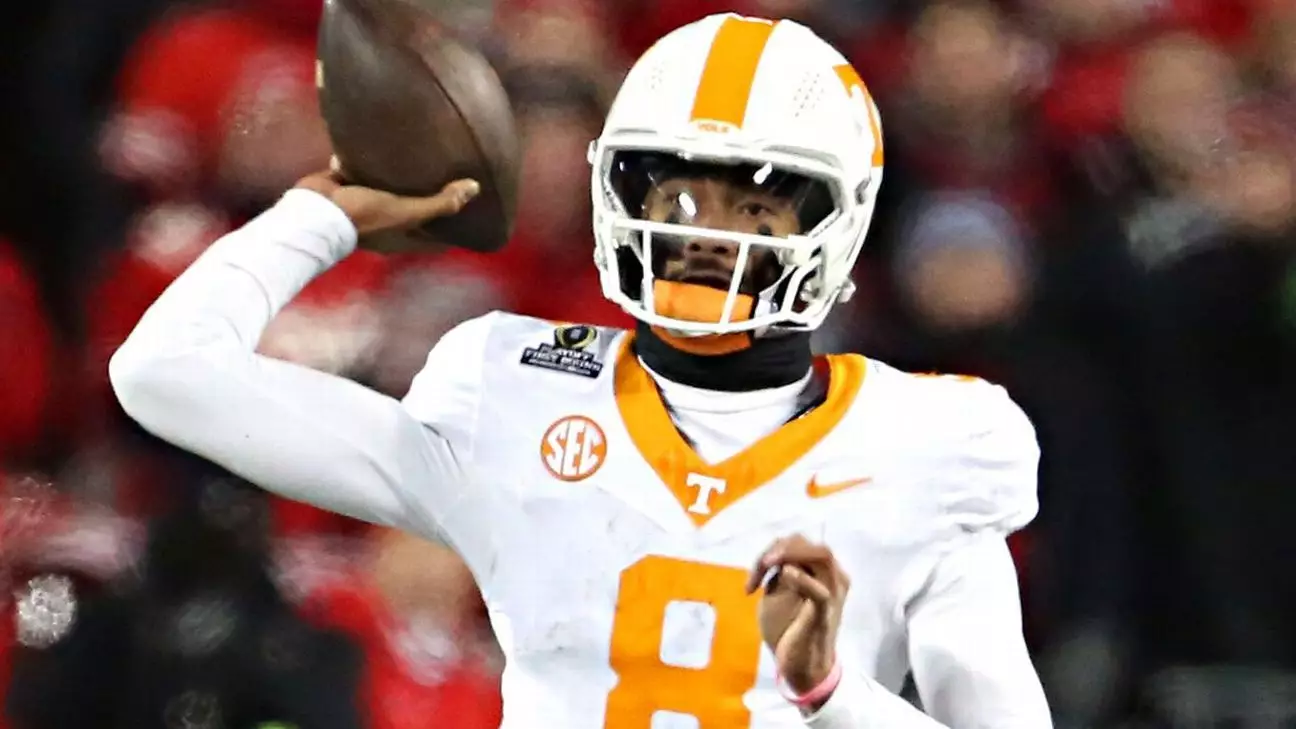The ongoing transfer saga of Nico Iamaleava from Tennessee to UCLA is unfolding as a microcosm of college football’s rapidly shifting landscape. The mere mention of Iamaleava’s name conjures images of a dynamic quarterback boasting immense potential, yet the nuances of this transfer reveal a narrative of tension, expectation, and disappointment—a narrative far more complex than the headlines suggest. UCLA’s coaching staff has reportedly engaged in discussions with current quarterbacks, hinting at an impending decision that could shake up the program. The fact that Iamaleava has become a focal point underscores the high stakes entwined within recruitment today.
In the age of instant information and social media frenzy, the negotiations surrounding Iamaleava and his potential transfer have taken on a surreal quality. Sources indicate that his asking price, reportedly above $4 million, may remain elusive for UCLA, illustrating the financial pressures that permeate modern college athletics. It raises a significant question: should the pursuit of athletic talent be dictated by financial capability, creating a system where wealth becomes a gatekeeper rather than merit? Herein lies a foundational conflict, reflecting broader themes of economics and ethics in the collegiate sporting arena.
The Weight of Expectations
For UCLA, securing Iamaleava’s transfer would not just be a notable achievement but a pivotal move that could potentially reshape its football program. Coach DeShaun Foster’s tenure began with mediocrity, evidenced by a 5-7 finish in his debut season. In a world where every win counts, an elite talent like Iamaleava may be viewed as the catalyst for revitalization. However, the reality is that reliance on a single player to uplift a struggling program places undue pressure on ambitious young athletes.
Critically, this perspective is emblematic of UCLA’s approach in a competitive landscape where expectations often spiral out of control. During his first year, Iamaleava led Tennessee to the College Football Playoff, but his statistics might paint a less flattering picture when scrutinized closely. Against formidable SEC defenses, he consistently struggled to surpass 200 passing yards, questioning the readiness of one player to single-handedly rescue a struggling team. Expectations surrounding Iamaleava’s capabilities must be tempered with the understanding that football is a team sport; success requires cohesive effort rather than reliance on individual brilliance alone.
The Reality of College Football’s Financialization
The tensions between UCLA’s resources and Iamaleava’s financial demands expose the underlying commercialization of college athletics, which has spiraled out of control in recent years. The dichotomy between Iamaleava’s previous contract at Tennessee, which reportedly hovered around $2.4 million but had the potential to escalate significantly, versus what UCLA can afford reveals a systemic inequity that leads not only to recruitment challenges but ethical dilemmas that surround the sport. As college football morphs into a billion-dollar industry dominated by wealth and deals, the landscape increasingly favors schools and players with access to abundant resources.
Yet, it is essential to ask: what does it mean for athletes and their development? Should college athletes, at this formative stage of their lives, be forced to navigate a mercurial market system demanding compliance with capitalistic expectations? This situation invites scrutiny and begs for a serious reconsideration of the values underpinning college sports. The allure of astronomical contracts can shatter young dreams while redirecting attention away from the essential components of education and holistic athlete development.
The ambivalence surrounding Iamaleava’s potential transfer speaks volumes about the structural challenges faced by college football programs in an era increasingly defined by monetary considerations over athleticism and teamwork. It reflects a moment in time where the imperative to win is overshadowed by financial viability, leading to a cycle of reactive decisions with far-reaching consequences. As UCLA inches closer to possibly welcoming a five-star quarterback, the implications extend beyond the football field, probing deeper questions about priorities and values.
In an arena bursting with potential yet fraught with pitfalls, the future of college football hinges on evaluating the engagements of talent, resources, and ethics—with Nico Iamaleava now serving as an unexpected, yet powerful symbol of this ongoing evolution.


Leave a Reply